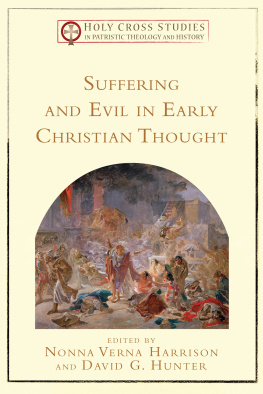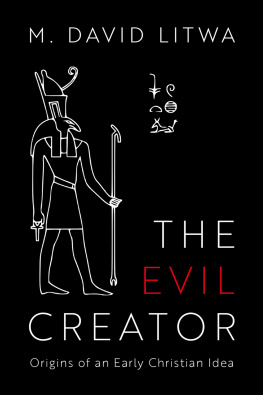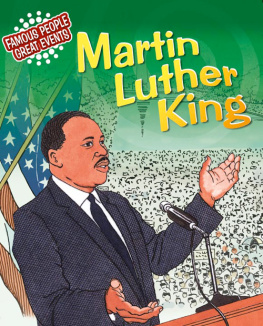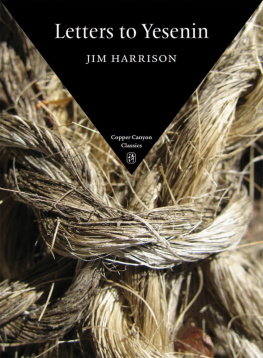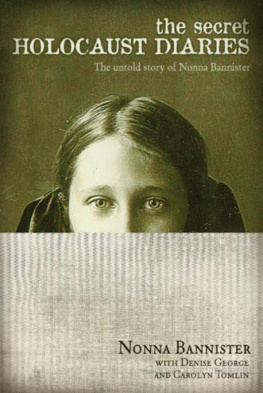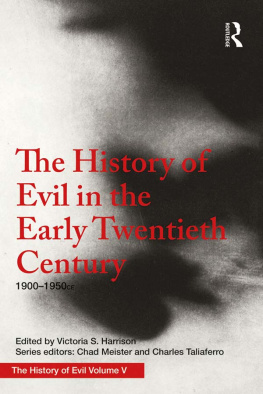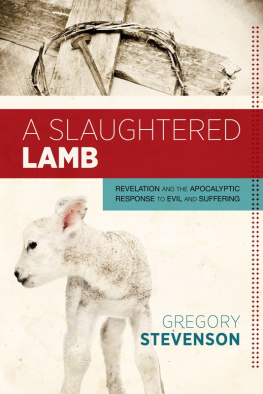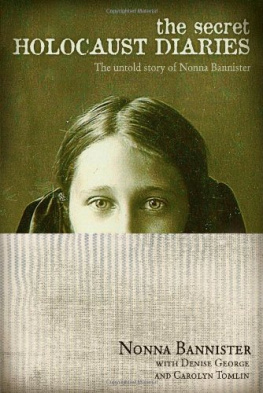Harrison Nonna Verna - Suffering and evil in early Christian thought
Here you can read online Harrison Nonna Verna - Suffering and evil in early Christian thought full text of the book (entire story) in english for free. Download pdf and epub, get meaning, cover and reviews about this ebook. year: 2016, publisher: Baker Academic, genre: Religion. Description of the work, (preface) as well as reviews are available. Best literature library LitArk.com created for fans of good reading and offers a wide selection of genres:
Romance novel
Science fiction
Adventure
Detective
Science
History
Home and family
Prose
Art
Politics
Computer
Non-fiction
Religion
Business
Children
Humor
Choose a favorite category and find really read worthwhile books. Enjoy immersion in the world of imagination, feel the emotions of the characters or learn something new for yourself, make an fascinating discovery.
- Book:Suffering and evil in early Christian thought
- Author:
- Publisher:Baker Academic
- Genre:
- Year:2016
- Rating:4 / 5
- Favourites:Add to favourites
- Your mark:
- 80
- 1
- 2
- 3
- 4
- 5
Suffering and evil in early Christian thought: summary, description and annotation
We offer to read an annotation, description, summary or preface (depends on what the author of the book "Suffering and evil in early Christian thought" wrote himself). If you haven't found the necessary information about the book — write in the comments, we will try to find it.
Suffering and evil in early Christian thought — read online for free the complete book (whole text) full work
Below is the text of the book, divided by pages. System saving the place of the last page read, allows you to conveniently read the book "Suffering and evil in early Christian thought" online for free, without having to search again every time where you left off. Put a bookmark, and you can go to the page where you finished reading at any time.
Font size:
Interval:
Bookmark:

Editorial Board
Khaled Anatolios
Alkiviadis Calivas
Robert J. Daly, SJ
Paul Gavrilyuk
Jennifer Hevelone-Harper
Edith Humphrey
published under the auspices of
The Stephen and Catherine
P APPAS P ATRISTIC I NSTITUTE
of
H OLY C ROSS G R E E K O R T H O D O X S C H O O L O F T HEOLOGY
B ROOKLINE , M ASSACHUSETTS
Previously published in the series
Wealth and Poverty in Early Church and Society
edited by Susan R. Holman
Apocalyptic Thought in Early Christianity
edited by Robert J. Daly, SJ
The Holy Trinity in the Life of the Church
edited by Khaled Anatolios
2016 by The Stephen and Catherine Pappas Patristic Institute of Holy Cross Greek Orthodox School of Theology
Published by Baker Academic
a division of Baker Publishing Group
P.O. Box 6287, Grand Rapids, MI 49516-6287
www.bakeracademic.com
Ebook edition created 2016
All rights reserved. No part of this publication may be reproduced, stored in a retrieval system, or transmitted in any form or by any meansfor example, electronic, photocopy, recordingwithout the prior written permission of the publisher. The only exception is brief quotations in printed reviews.
Library of Congress Cataloging-in-Publication Data is on file at the Library of Congress, Washington, DC.
ISBN 978-1-4934-0580-0
Unless otherwise indicated, Scripture quotations are from the New Revised Standard Version of the Bible (NRSV), copyright 1989, by the Division of Christian Education of the National Council of the Churches of Christ in the United States of America. Used by permission. All rights reserved.
Scripture quotations labeled NJPS are from the New Jewish Publication Society Version 1985 by The Jewish Publication Society. All rights reserved.
Scripture quotations labeled RSV are from the Revised Standard Version of the Bible, copyright 1952 [2nd edition, 1971] by the Division of Christian Education of the National Council of the Churches of Christ in the United States of America. Used by permission. All rights reserved.
Cover
Series Page
Title Page
Copyright Page
Preface by David G. Hunter
Introduction by Nonna Verna Harrison
1. An Overview of Patristic Theodicies
Paul L. Gavrilyuk
2. Theodicy in Apocalyptic Thought: From Ancient Visions to (Post)Modern Nightmares
John W. Martens
3. The Suffering of Martyrdom: Greek Perspectives in the Fourth and Fifth Centuries
James C. Skedros
4. Learning through Experience: The Pedagogy of Suffering and Death in Irenaeus
John Behr
5. The Enemies of God: Demons and the Persecuting Emperors in Lactantius
Dennis P. Quinn
6. Christus Victor in the Work of Ephrem, Narsai, and Jacob of Serug
Gary A. Anderson
7. Greek Patristic Perspectives on the Origins of Social Injustice
Nonna Verna Harrison
Douglas Finn
9. John Chrysostom on the Man Born Blind (John 9)
Nonna Verna Harrison
10. The Deaths of Macrina and Monica in Gregory of Nyssas Life of Macrina and Augustines Confessions : The Female Philosopher and the Problem of Christian Grief
Regina L. Walton
11. Evil, Suffering, and Embodiment in Augustine
David G. Hunter
12. Theodore of Mopsuestia and the Pedagogy of Destruction
Eric Phillips
13. The Word and His Flesh: Human Weakness and the Identity of Jesus in Greek Patristic Christology
Brian E. Daley, SJ
14. Suffering Impassibly: Christs Passion in Cyril of Alexandrias Soteriology
J. Warren Smith
15. The Impassible Suffers
Kallistos Ware, Metropolitan of Diokleia
Abbreviations
Bibliography
List of Contributors
Subject Index
Modern Authors Index
Scripture Index
Back Cover
D A V I D G. H U N T E R
T his volume of essays has its distant origins in the Third Annual Conference of the Pappas Patristic Institute, Evil and Suffering in the Patristic Period, held at Holy Cross Greek Orthodox School of Theology, October 1214, 2006. Owing to a variety of factors, its publication has been delayed, but this delay has enabled the editors to produce a collection that differs in many respects from the original conference presentations. All of the original six plenary lectures have been included (Anderson, Behr, Harrison, Hunter, Skedros, and Ware), although most in a considerably revised form. Of the original twenty-four shorter communications delivered at the 2006 conference, only six are present here (Finn, Gavrilyuk, Martens, Phillips, Quinn, and Walton). An effort was made to include chapters that addressed a range of patristic writers, Eastern and Western, and that would be accessible to a wide audience. Because this topic deserves a theologically nuanced treatment, the editors decided to solicit additional essays, including two that highlighted the christological contribution of patristic thought to the problem of evil and suffering (Daley, Smith).
The editors express their thanks to a number of people who have supported this project. First, thanks are owed to Dr. Bruce Beck, director of the Pappas Patristic Institute, for organizing the original conference and facilitating the participation of the contributors. We also acknowledge the assistance of the Editorial Board of the series Holy Cross Studies in Patristic Theology and History, which conducted an initial screening of the papers presented at the conference. We also thank Professor Brian Daley of the University of Notre Dame and Professor J. Warren Smith of Duke University Divinity School for agreeing to contribute their essays to the collection. Let me also thank Nonna Verna Harrison for her essay about John Chrysostom on the man born blind, written for this volume.
We appreciate Mr. James Kinney of Baker Academic, who saw the project through the final stages of production. Most of all we express our deep gratitude to Dr. James Ernest, who departed Baker Academic for William B. Eerdmans Publishing just as this volume was going to press. James has been a stalwart supporter of the Pappas Patristic Institute conferences and has enabled the Holy Cross Studies in Patristic Theology and History to prosper. We wish him the very best in his new position.
Finally, we acknowledge the publishers who have granted permission to reprint material that has been published elsewhere: Yale University Press, for allowing us to use material from Gary Andersons book Sin: A History (Yale University Press, 2009) in his chapter Christus Victor in the Work of Ephrem, Narsai, and Jacob of Serug; Eerdmans, for letting us reprint Brian Daleys chapter, The Word and His Flesh: Human Weakness and the Identity of Jesus in Patristic Christology, which originally appeared in Seeking the Identity of Jesus , edited by Beverly Gaventa and Richard Hays (Eerdmans, 2008), 25169; and Pro Ecclesia , which originally published J. Warren Smiths essay, Suffering Impassibly: Christs Passion in Cyril of Alexandrias Soteriology, Pro Ecclesia 11, no. 4 (Fall 2002): 46383.
N ONNA V E R N A H A R R I S O N
W hat do we think of when we consider the end of the world? Nuclear war, robots or computers taking over the earth with humans as their slaves, a meteor strike blocking the earths sunlight and causing living things to die, climate change gone awry, exhaustion of the earths resources? Or perhaps the devil attacking everyone, pitting brother against brother, inspiring a ruthless dictator, and finally eradicating all human life? Whatever it is, it is probably a mega-nightmare scenario. One imagines oneself, as a mere human being alone, or even in a large family, completely overwhelmed and unable to begin to cope with the life-threatening challenges.
Font size:
Interval:
Bookmark:
Similar books «Suffering and evil in early Christian thought»
Look at similar books to Suffering and evil in early Christian thought. We have selected literature similar in name and meaning in the hope of providing readers with more options to find new, interesting, not yet read works.
Discussion, reviews of the book Suffering and evil in early Christian thought and just readers' own opinions. Leave your comments, write what you think about the work, its meaning or the main characters. Specify what exactly you liked and what you didn't like, and why you think so.

